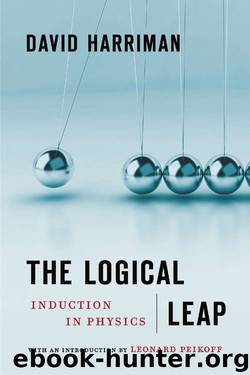The Logical Leap: Induction in Physics by David Harriman

Author:David Harriman [Harriman, David]
Language: eng
Format: epub
ISBN: 9781101659977
Publisher: Penguin Publishing Group
Published: 2010-07-05T22:00:00+00:00
Scientists who follow the rationalist method attempt to bypass the process of discovery. Using nothing more than imagination and deduction, they fabricate whole sciences—discovering no knowledge, while leaving no questions unanswered. Newton’s inductive method leads to the opposite result: an enormously expanded context of knowledge, with each discovery giving rise to further questions.
Today, Newton’s refusal to speculate about an underlying mechanism of gravitational attraction is sometimes misinterpreted in a way that would have been inconceivable to him. The modern empiricists, in an effort to claim Newton as one of their own, argue that he advocated a noncausal, descriptive approach to physics.10 But Newton was not a skeptic. In conjunction with the laws of motion, the law of gravitation is the very archetype of a causal law: It states a necessary relationship between a property of an entity (mass) and its action. Throughout the Principia, Newton was focused on identifying causal relationships.
The final book of the Principia is appropriately titled “The System of the World.” Newton had inherited a wealth of knowledge from his predecessors, but it was knowledge that consisted of separate laws belonging to separate sciences. Newton induced the fundamental causal relationships that connected this knowledge into a systematic whole. With this achievement, the science of physics reached maturity.
Here we see the result of the inductive method in its full glory.
Download
This site does not store any files on its server. We only index and link to content provided by other sites. Please contact the content providers to delete copyright contents if any and email us, we'll remove relevant links or contents immediately.
Enlightenment Now: The Case for Reason, Science, Humanism, and Progress by Steven Pinker(7303)
A Journey Through Charms and Defence Against the Dark Arts (Harry Potter: A Journey Through…) by Pottermore Publishing(4796)
The Immortal Life of Henrietta Lacks by Rebecca Skloot(4571)
A Journey Through Divination and Astronomy by Publishing Pottermore(4373)
Elon Musk by Ashlee Vance(4118)
Origin Story: A Big History of Everything by David Christian(3679)
COSMOS by Carl Sagan(3616)
Alchemy and Alchemists by C. J. S. Thompson(3506)
Bad Pharma by Ben Goldacre(3417)
Enlightenment Now by Steven Pinker(3363)
Shadow of Night by Deborah Harkness(3352)
Inferior by Angela Saini(3310)
A Mind For Numbers: How to Excel at Math and Science (Even If You Flunked Algebra) by Barbara Oakley(3293)
Origin Story by David Christian(3191)
The Code Book by Simon Singh(3168)
Signature in the Cell: DNA and the Evidence for Intelligent Design by Stephen C. Meyer(3123)
The Elements by Theodore Gray(3048)
A Brief History of Time by Stephen Hawking(3017)
A Journey Through Potions and Herbology (A Journey Through…) by Pottermore Publishing(2843)
